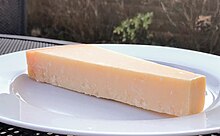
Back Parmesaan Afrikaans بارميجيانو ريجيانو Arabic Quesu parmesano AST Parmezan pendiri Azerbaijani Пармезан Byelorussian Пармэзан BE-X-OLD Пармиджано-Реджано Bulgarian Parmigiano Reggiano Breton Parmesà Catalan Parmezán Czech
| Parmesan | |
|---|---|
 | |
| Other names | Parmigiano Reggiano (in Italian) |
| Country of origin | Italy |
| Region | Emilia-Romagna |
| Town | Provinces of Parma, Reggio Emilia, Modena, Bologna (west of the River Reno) and Mantua (on the right/south bank of the River Po) |
| Source of milk | Cows (mostly Friesian and Reggiana cattle) |
| Pasteurised | No |
| Texture | Hard |
| Aging time | Minimum: 12 months Vecchio: 18–24 months Stravecchio: 24–36 months |
| Certification | Italy: DOP: 1955 EU: PDO: 1992 |


Parmesan (Italian: Parmigiano Reggiano, Italian: [parmiˈdʒaːno redˈdʒaːno]) is an Italian hard, granular cheese produced from cow's milk and aged at least 12 months or, outside the European Union and Lisbon Agreement countries, a locally produced imitation.
Parmigiano Reggiano is named after two of the areas which produce it, the Italian provinces of Parma and Reggio Emilia (Parmigiano is the Italian adjective for the city and province of Parma and Reggiano is the adjective for the province of Reggio Emilia); it is also produced in the part of Bologna west of the River Reno and in Modena (all of the above being located in the Emilia-Romagna region), as well as in the part of Mantua (Lombardy) on the south bank of the River Po.
The names Parmigiano Reggiano and Parmesan are protected designations of origin (PDO) for cheeses produced in these provinces under Italian and European law.[1] Outside the EU, the name Parmesan is legally used for similar cheeses, with only the full Italian name unambiguously referring to PDO Parmigiano Reggiano.
It has been called the "king of cheeses"[2] and "practically perfect food".[3]
- ^ Case C-132/05 Commission v Germany European Commission Legal Service, July 2008 Archived 2019-04-05 at the Wayback Machine
- ^ Cite error: The named reference
FakeForbeswas invoked but never defined (see the help page). - ^ Ruggeri, Amanda (January 28, 2019). "Italy's practically perfect food". BBC. Retrieved July 1, 2024.